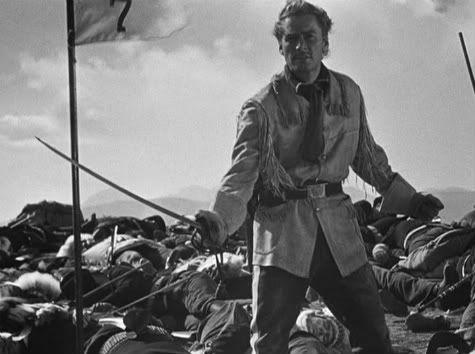 The movie has Errol Flynn playing George Armstrong Custer in a story line that is mostly fictional. Custer goes to West Point and gets in a lot of trouble (at the same time that Flynn in real life was on trial for taking up with under age girls). The camera loves the dashing Flynn, caught here in the short time span between when he has acquired some acting skills and before the effects of his hard life style begin to show up on his face.
The movie has Errol Flynn playing George Armstrong Custer in a story line that is mostly fictional. Custer goes to West Point and gets in a lot of trouble (at the same time that Flynn in real life was on trial for taking up with under age girls). The camera loves the dashing Flynn, caught here in the short time span between when he has acquired some acting skills and before the effects of his hard life style begin to show up on his face.
The first half of the movie is played in a light comedic manner as Custer, who graduated last in his class, dodges in and out of trouble at West Point. There is a scene where the Southern cadets, who won't swear a loyalty oath to the Union, are marched off the grounds as the band plays Dixie. National unity in 1941 was more important than real history. With the outbreak of the Civil War, Custer's class is graduated early and he heads off the Washington, DC to await orders. When he gets orders he is determined to make a name for himself and when he gets in to battle he makes sure that he does. He gets a promotion to general, temporarily, and tries to get as much glory as he can.
After the war he gets an appointment out West, in the Dakotas. When Custer first sees Crazy Horse (played by Anthony Quinn), they line up, like in a medieval joust, and Custer knocks Crazy Horse off his horse. He orders Crazy Horse to bring back the horses his warriors have taken, and Crazy Horse complies. He takes Crazy Horse in to the fort as a prisoner.
When Custer finds the trading post selling rifles to the Indians. He also finds all his men at the post bar drinking and Crazy Horse soon escapes. Custer has his work cut out for him. Before long Custer has a crack regiment marking to the Garyowen tune. The movie then flashes the words 'And so was born the 7th US Calvary which cleared the plains for a ruthlessly advancing civilization that spelled doom to the red race.' Very interesting phrasing for a movie from 1941 to acknowledge the 'ruthless' advancement of civilization.
Crazy Horse then speaks broken English with Long Hair (Custer). Crazy Horse is willing to give up everything except the Black Hills. Crazy Horse trusts Long hair, but not the words of the white man. A treaty is signed and the whites are not allowed in the Black Hills. Evil businessmen plot to get their hands on that territory too, because there is money to be made. They make up a rumor of gold in the Black Hills to get the white men streaming in.
Custer gets in trouble when he tries to interfere with the scoundrels plans and is to be court martialed. He goes back to Washington and tries to tell the politicians what is really going on. He says the Indians can't be blamed. He says: "If I were an Indian I'd fight beside Crazy Horse to the last drop of my blood." When the committee dismisses his claims, Custer barges in on President Grant, who hates him and talks him in to giving him his command back.
Custer leads the 7th out to meet General Crooks and Terry at the Little Big Horn. Custer decides he has to attack to save General Terry's infantry. He is willing to sacrifice himself and his men to save the lives of others.
Lt. 'Queen's Own' Butler: Why are you asking me to go back with it?
George Armstrong Custer: Well, for one thing you're an Englishman, not an American.
Lt. Butler: Not an American! What do you Yankees think you are? The only REAL Americans in this merry old parish are on the other side of the hill with feathers in their hair.
George Armstrong Custer: You're probably right about that. But there's 6,000 of them... and less than 600 of us. The regiment's being sacrificed, Butler, and I wouldn't want to see a foreigner butchered in a dirty deal like this.
The Sioux join with the Cheyenne, Arapahoes and Blackfeet and Custer goes charging in and is surrounded. The Indians charge and are shot down by Custer's circled troops. Eventually Attacking Indians wear them down and even Custer is killed when he runs out of bullets, although he was the last man standing.
Custer goes down as a hero who sacrificed his life.
A good movie, which was somewhat sympathetic to the Indians, although there wasn't too much truth in it. Even though this was a great Indian victory, the focus was not on the Indians, but on Custer. It was important in 1941 for Americans to have heroes, and they weren't ready to make one of Crazy Horse just yet.
|